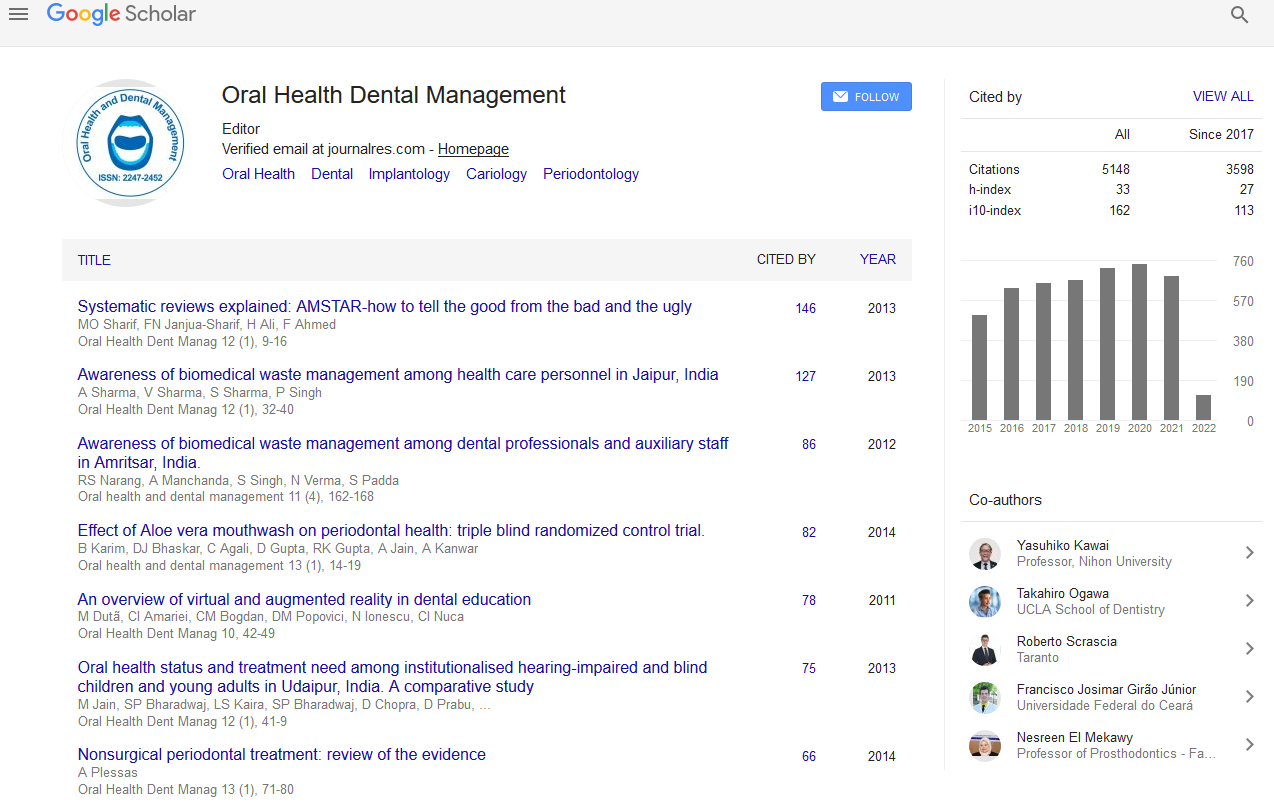Indexed In
- The Global Impact Factor (GIF)
- CiteFactor
- Electronic Journals Library
- RefSeek
- Hamdard University
- EBSCO A-Z
- Virtual Library of Biology (vifabio)
- International committee of medical journals editors (ICMJE)
- Google Scholar
Useful Links
Share This Page
Journal Flyer

Open Access Journals
- Agri and Aquaculture
- Biochemistry
- Bioinformatics & Systems Biology
- Business & Management
- Chemistry
- Clinical Sciences
- Engineering
- Food & Nutrition
- General Science
- Genetics & Molecular Biology
- Immunology & Microbiology
- Medical Sciences
- Neuroscience & Psychology
- Nursing & Health Care
- Pharmaceutical Sciences
Bio-ceramic technology in endodontics
24th International Conference and Exhibition on Dentistry & Oral Health
April 17-19, 2017 Dubai, UAE
Duaa Abo AlSamh
Prince Sultan Military Medical City, KSA
Posters & Accepted Abstracts: Oral Health Dent Manag
Abstract:
Bio-ceramics are biocompatible ceramic materials applicable for use in medicine and dentistry. They include alumina and zirconia, bioactive glass, glass ceramics, calcium silicates, hydroxyapatite and resorbable calcium phosphates, and radiotherapy glasses. Bio ceramics were mainly used for orthodontics applications and as coats for dental implants. Bioceramics were also introduced to endodontics and its application varies from their use for pulp capping to apexogenesis, apexification, and furcation repair. Advancements in bio-ceramic technology have revolutionized endodontic material science by enhancing the treatment outcome for patients. It is very important to understand the specific advantages of bio ceramic in dentistry and why they are so popular, the first reason is its physical properties. Bio-ceramics are biocompatible, nontoxic, do not shrink and chemically stable within the biological environment and most importantly its ability to form hydroxyapatite during setting and create a bond between the dentin and the filling material which is very important in endodontics. The aim of this review is to summarize briefly newly introduced bio-ceramic materials used in endodontic and their specific clinical characteristics, properties, applications and mode of action. In addition, discussing how to achieve a true bond between the root canal wall and the master cone which is known as the�?� Synchronized hydraulic technique�?�, using bio ceramic sealer (Endosequence BC sealer compined with coated cones).
Biography :
Duaa Abo AlSamh is an Endodontic and Restorative Consultant at Prince Sultan Military Medical City (PSMMC) in Riyadh, Saudi Arabia. She completed her Master’s Degree in Dental Science and her Endodontic Certificate in 1996 from Dental College, King Saud University, Riyadh, Kingdom of Saudi Arabia. She finished her Restorative Board Certification in 2004 from Saudi Council for Health Specialty in Riyadh, Kingdom of Saudi Arabia. Currently, she is a member of the Continuous Quality Improvement and Patient Safety (CQI & PS) at PSMMC.
Email: Duaa1_2000@yahoo.com

